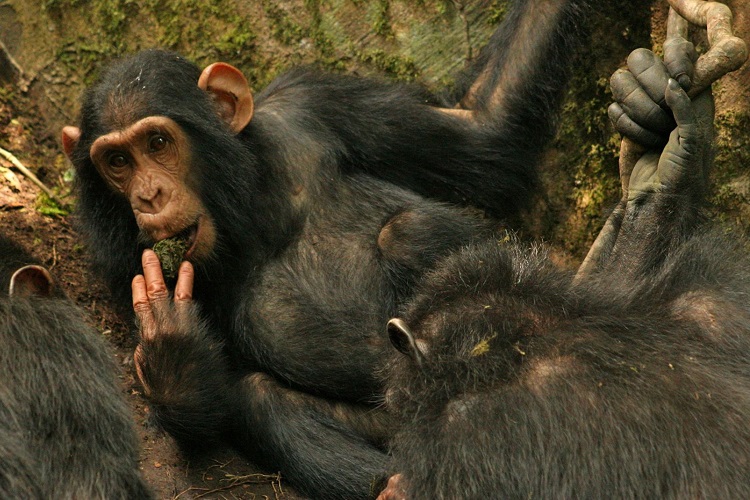Wild chimpanzees share knowledge of more effective tools

Wild chimpanzees have the ability to develop more effective tools, according to new research from the Universities of St Andrews and Neuchâtel in Geneva.
Previous studies of the use of tools in the Sonso wild chimpanzee community of the Budongo Forest in Uganda have documented the use of moss to manufacture vegetal sponges.
In a new study published today (Wednesday 10 October) in Proceedings of the Royal Society B: Biological Sciences researchers investigated the reasons why this behaviour spread in the community when so many chimpanzee innovations remain one-off occurrences.
In a study of 20 wild chimpanzees during the dry season, water was placed in a hole in a log on the pathway of travelling chimpanzees and moss and leaves to make sponges to make tools to collect water were made available.
Out of 20 chimpanzees, only nine (‘moss-spongers’) had the knowledge of both moss and leaves to manufacture sponges. The remaining 11 (‘leaf-spongers’) only knew how to manufacture leaf- but not moss-sponges. The researchers found that seven of nine moss-spongers favoured moss to manufacture their sponges. In contrast, only three out of 11 leaf-spongers in the experiment favoured moss over leaves.
Professor Klaus Zuberbuhler of the School of Psychology and Neuroscience at St Andrews said:
“Our study shows that a cultural innovation in wild chimpanzees has spread throughout the community most likely because it is more efficient than the ancestral variant. Thus, a behaviour that constitutes the bulk of Sonso chimpanzee cultural knowledge, leaf-sponging, has evolved towards a more advantageous version for the same purpose, moss-sponging, favoured by knowledgeable chimpanzees in a field experiment.
“This cumulative evolution of cultural behaviour has long been believed to be limited to humans. Our study shows that this is not the case and that chimpanzee cultures can also evolve, suggesting that this was already the case in our common ancestor.”
‘Wild chimpanzees select tool material based on efficiency and knowledge’ is published in the journal Proceedings of the Royal Society B: Biological Sciences.
The DOI is: dx.doi.org/10.1098/rspb.2018.1715
Photo courtesy of Dr Cat Hobaiter.
Issued by the University of St Andrews Communications Office.